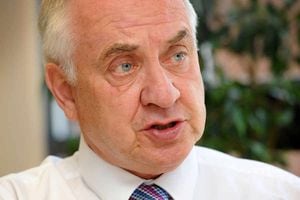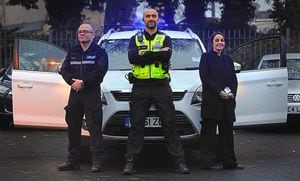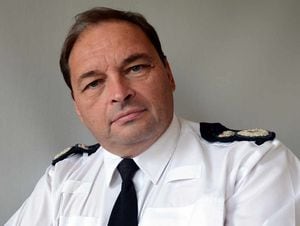Cuts leading us on uncertain road, says West Midlands PCC
West Midlands Police and Crime Commissioner David Jamieson today insisted 'this is not a litany of doom' after huge cuts to the force were announced.

Discussing the cuts, Mr Jamieson said the 'government are taking us down a road of uncertainty'.
"If we lose up to 2,500 more people it leaves the Chief Constable facing a huge challenge," he said. "But it is not a litany of gloom. We have got to modernise and ensure that the loss does not have the huge negative impact it would have done if we had done nothing.
Branch deputy chairman Tom Cuddeford warned: "Less officers working the beat mean less engagement with local communities and less people giving us information. The first point of contact with the police for many people is a chat with the bobby on the beat who is unlikely to be there any more – and police station front offices are also being closed.
"It is fine to say contact the police online but a lot of people prefer to do it face to face. By assuming technology is always the way forward we could be cutting off communications with important and very vulnerable members of society, particularly among the elderly. If police are not seen on the streets there will be those who think we do not care and are not worth giving information to.
"We went into neighbourhood policing to reassure the public and build up their trust and confidence. Now that is in danger of being lost. We will go back to being a responsive rather than preventative police service, arriving after the fight has finished rather than before the argument turns into a fight."
He stressed: "This is not an attack on the Chief Constable or the police and Crime Commissioner. We sympathise with the position they find themselves in. Neither wants to reduce neighbourhood policing but when it comes to the pinch point it has to take a hit."
Branch secretary Steve Grange added: "The new technology will be an asset if it is as good as they say it will be but it is not necessarily the panacea.
"I am absolutely confident that we will get down this road. I am less than confident that we will get all the way down but that will not stop us straining every sinew to get there."
Today's news signals a major shift in policing, with less emphasis on crime committed in public and greater involvement with what happens behind the closed doors of homes and over the internet.
Chief Constable Chris Sims explained: "Policing is moving decisively from its roots in controlling public space to a position where its workload is dominated by interventions in the private spheres, between individuals and online.
"We have had to make assumptions about our financial position over the next four years because we will not know the true picture until after the General Election. We have anticipated losing a further 2,000 to 2,500 officers and staff and cutting another £120m from the budget between now and 2020.
"This will mean that uniform patrol becomes a tightly focused activity taking place in only the most demanding places. In other words we will become a less visible service by 2020."
Mr Sims said neighbourhood policing would no longer be a 'universal offer', with teams instead given specific crimes to target and to deal with the problem wherever it arises in the force area, along similar lines to the current Safer Travel Partnership. This is a specialist squad working with Centro, British Transport Police and operators like National Express to cut anti-social behaviour and other crime on the region's transport network.
Other changes will see technology used to understand patterns of behaviour through wide ranging features such as weather, holidays and traffic in a bid to predict potential problems and prevent bad things happening by ensuring police officers are in the right place at the right time.
People will increasingly have to report crime online and the successful offender management scheme - Sandwell and Dudley have some of the best results in the country in stopping convicted criminals from committing further crime - will be expanded.
The force will pool resources with councils and other organisations to fund collective projects to deal with issues such as working with problem families to nip potential lawlessness in the bud before it can becomes a major issue.
A prime example of this is the recently launched Black Country mental health triage team in which police, paramedics and psychiatric nurses work together in a revolutionary change to the way mental health emergencies are dealt with.

It means people get better treatment faster and far fewer need to be detained under the Mental Health Act saving vast amounts of time and money for police and ambulance crews who previously dealt with the dramas alone.
Other ideas include speeding up inquiries into crimes such as burglary by immediately downloading information like CCTV mapping of the area, fingerprint and criminal record details and even DNA to the officer at the scene through mobile technology and making more use of body-worn cameras.
Officers and staff from private company Accenture, who the force have teamed up with, will spend the next two months developing a business case around each of the 36 projects so that they are introduced in sequence after firms are chosen for the jobs.

Mr Jamieson said: "We have got to change to face the fresh challenges of the 21st Century. The West Midlands is probably making the most radical changes of any of the 43 police forces in Britain and lurking behind all this is austerity.
"We have to make cuts and 83 per cent of the budget is paying staff so you do not have to be Einstein to realise we cannot sustain the current staffing level.
"We must have the confidence and support of the people to do the job properly. If we lose that crime will run out of control
"We have a big explanation job to do. We are making major changes and have got to take the public with us. Part of my job is to help people understand what is going on and why.This is not going to be one big bang. It will be a process of change over the next four to five years.
"If we did nothing that would put a huge extra burden on the remaining police officers in the force. We have got to give them the tools and training to enable them to work more effectively. At the moment their time is not used as well as it could be.
"The changes that are envisaged will liberate them to do the really valuable things such as being able to deal with people face to face. That something we will protect to the end.
"We cannot guarantee there will be the same frequency of patrols but we want to ensure that the quality of contact with those who have problems is enhanced. People do not necessarily want to se bobbies walking past their window all the time. They want crime solved and if there is a problem with a particular type of offence in an area the officers will focus on that."
